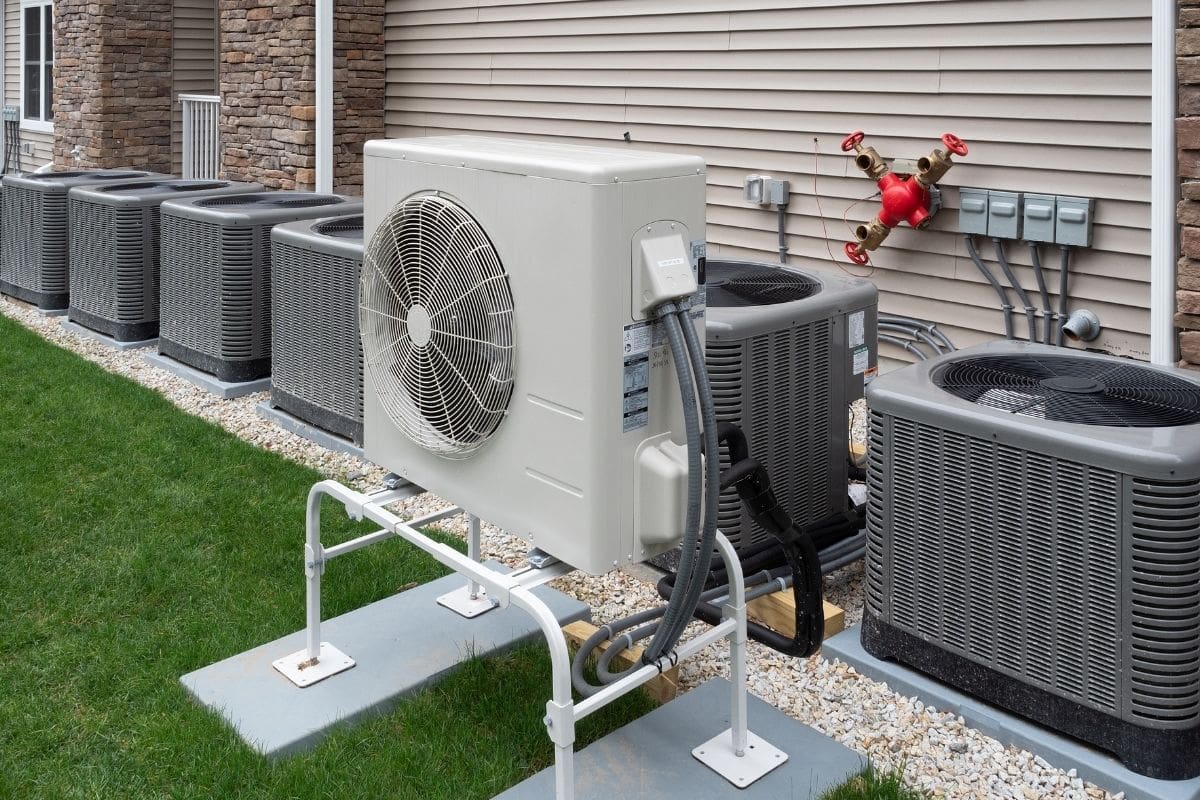As the world continues to search for renewable and planet-friendly systems and resources, air-source heat pumps are becoming increasingly popular.
One of the main concerns about these systems, however, is the amount of noise that they generate – and we have decided to take a closer look to help ensure that you have all the information that you need.
How Does A Heat Pump Work?
A heat pump takes heat from outside and moves that heat inside your home. It uses electricity to deliver heat into your home, but the quantity of heat delivered is far greater than the quantity of energy used to power the system itself.
A heat pump captures energy from the environment and uses a small amount of electricity when producing warm (35-50 degree) water, so they emit much less CO2 – this is good news for the planet, as well as your energy bills!
Is An Air-To-Water Heat Pump Right For Me?
Heat pumps are suitable for many kinds of homes, air to water heat pumps are the main type of domestic heat pump used in the UK. There are a few things you need to consider before deciding whether a heating system is right for you.
The first thing to do is check the heating requirements of your property – there are some limitations when working with certain types of heat pumps.
Do You Have Somewhere To Put It?
You’ll want a space outside your house where a unit can be installed on a wall or placed on a ground surface. It must be large enough so that there’s plenty of room for airflow.
There are two main categories of air-to-water heat pumps: monobloc and split systems.
A monobloc heat pump system has all the components for pumping water into your house in one outdoor unit, with pipes running from the outdoor unit to an indoor unit where the water circulates through the heating system and a hot water cylinder.
A split system separates indoor and outdoor components. Depending on your budget and the size of your property, whether a monobloc or a split system is right for your property will depend on your budget.
Monobloc tends to be cheaper, quicker to install, and take up less space in your home, but they’re usually slightly less energy-efficient than split systems. Efficiency gains from split systems come from some heat being transferred inside the building where it’s warmer, resulting in less energy being lost.
If you don’t have any limitations regarding space inside your home, then it might be worth the extra cost to install a split system. Your installer should be there to help you choose the design you want, and will help you to make the smartest choice depending on the needs of your home.
How Loud Is A Heat Pump?
For both monobloc and divided heat pumps, the external unit is exactly the same. Fans move air across the heat exchangers, creating noise.
Unless the heat pump works very hard (for example, in cold weather or when producing hot water), you can expect its noise to be similar to that of a refrigerator, if you were standing close by.
You could easily hold an ordinary conversation next to it without raising your voice, making it ideal for your home. As it gets colder out, this noise will increase, but should still allow for easy conversations, only raising your voice slightly.
The inside unit for an air conditioning unit only contains valves and pumps, making very little noise at all. Ultimately, heat pump noises are unlikely to be something that you need to worry too much about – the level of noise is unlikely to be a real issue.
How Will You Heat The Rooms In Your Home?
Most homes in the UK use radiators, underfloor heating systems, or a combination of both to circulate hot water through the house.
You may want to consider installing radiators or underfloor heat if you don’t already have them.
Heatpumps are super effective and energy efficient when producing lower flow temperature water (35-50 degrees). At these temperatures they produce the greatest COP (Coefficient of Performance). This can be as great as 280 – 400%, whereas an efficient boiler will work at 90%.
The main criticism aimed at heat pumps is that they don’t heat the temperature to a high enough degree. But this is due to the fact that most people have the wrong heat delivery system. A system comprising of single pannelled radiators will never suppy heat using this temperature water.
A user needs at least 2 – 3 larger pannelled radiators. Or even better, a user should pair their heatpump with underfloor heating.
Underfloor heating is the perfect partner for a heat pump as it offers a fantastic surface area to spread the heat throughout the room. An on demand system like WundaTherm will give users the perfect partner for heat pumps that can be controlled, on and off like radiators.
This is an excellent opportunity to ensure that the system is optimised to run on a heat pump, which means lower running costs.
Why Do Heat Pumps Make Such A Great Choice For Homeowners?
When installed correctly, a domestic heat pump could reduce energy usage by up to two thirds. Helping you spend less money on energy bills and keep more cash in your pocket each month. A heat pump also helps protect our planet – it’s one of the most environmentally-friendly forms of heating available today.
Can I Install My Own Heat Pump?
We recommend using a qualified installer who has experience fitting air source heat pumps. Look for a professionals that not only knows how to install the heatpump but also can help design the best delivery system to get the most out of it. Most suppliers offer free site visits for your convenience.
How Much Will It Cost?
Before making a decision about which heat pump to buy, you should calculate your average annual consumption. This will give you a real indication of how much you need to pay every year in order to keep warm throughout the winter months.
You should also think about whether you are likely to add any new areas into your property over the coming years, as these will affect the size of the heat pump you require.
In addition to this, you’ll need to take into account the space available to place everything, including the pipes, ducts, and compressors. Depending on where you live, there may also be additional charges associated with building work.
Keep all of these things in mind before choosing a supplier and getting started with a quote.
What Size Does My House Need?
A smaller home doesn’t necessarily mean a smaller heat pump. Your local heating engineer can help you determine what size will provide enough heating throughout your home.
Some factors to consider include room sizes and layout, number of floors and windows, whether there is central heating installed, and the amount of insulation inside the property.
If you’re not sure, they’re happy to come round with their measuring equipment and give you some advice on the best type of heat pump!
Final Thoughts
Air source heat pumps are considered one of the best ways to heat your home. They can significantly cut down on utility bills and greenhouse emissions and are now even becoming quite popular in Europe.
As an added bonus, noise levels from your air source heat pump should not be enough to have a negative impact on your daily life.
It is important to remember, an air source heat pump can only be as good as it’s delivery system. The radiators that have been installed in homes are specified to deliver heat based on higher temperature water (70-90 degrees).
Simply swapping a boiler out for a heat pump will not give you the desired result as the heat pump will need to heat higher temperature water to satisfy the existing heat delivery system (radiator system).
To get the most efficiency out of your heat pump, change you will need to change your radiators for radiators with more panels and heat output, or you should consider using underfloor heating.
A system such as our Rapid Response® is perfect and easy to retrofit and for new builds and is guaranteed to give you the best results from a heatpump.
Like all other important appliances, however, an air source heat pump will involve maintenance – from cleaning condensate lines to checking refrigerant levels. Make sure you choose the right company for the job and follow their instructions carefully.
If you’re looking for reliable service, get ready to find a true specialist!
